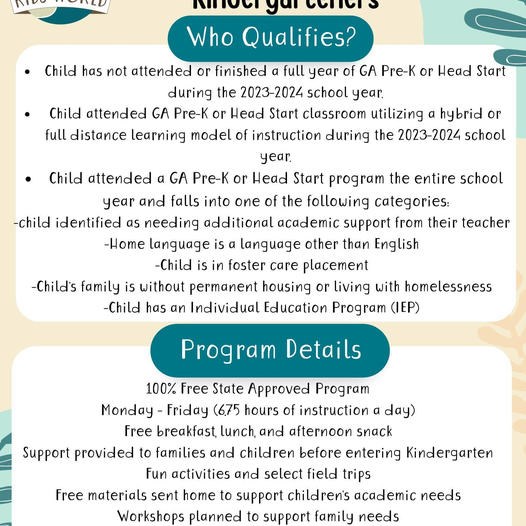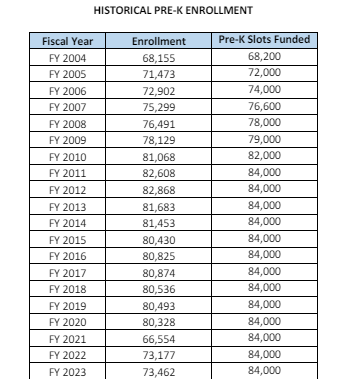As the next school year rolls around, it can be challenging for parents of incoming pre-k-aged children to figure out where they can attend school for the upcoming year.
To complicate matters, it was recently announced that the state of Georgia was reducing its Pre-K class sizes down from 22 to 20 students.
While this may sound like a controversial issue, Meghan McNail, the Director for Pre-K Instruction and Operations for Georgia's Department of Early Care and Learning, shared that, "Research shows that with smaller sized classrooms and fewer children per teacher (ratio), children have greater opportunities for interaction with adults and can receive more individualized attention, resulting in an increased learning that leads to better student outcomes."
Up until 2012, the normal Pre- K class size was only 20 kids. Since fiscal year 2012, the number of students was increased from 20 to 22 as a result of reduced state lottery revenues relative to the lottery revenue draw to fund HOPE scholarships and Pre-K during and following the Great Recession.
When doing the math, in the 2023-2024 school year, Bulloch County had 704 spots available for students. This upcoming year, they will only have 680. While that is a 24-child difference, the state of Georgia was allowed to fund more Pre-K classes.
Because the number of kids being registered for Pre-K is still significantly lower than it was before the pandemic, The Department of Early Childcare and Learning was able to fund additional classes to child care locations who applied for them. Only two applied in Statesboro and both were accepted.
The two childcare centers in Bulloch County that were able to add Georgia Pre-K classes are Bumblebee Childcare Learning Center and Smiles, Giggles and Hugs.
Even with the two additional options for parents, Bulloch County continues to have 24 fewer Pre-K class options than before the new guidelines went into effect.
Pre-K Bulloch County with new guidelines
- '24-'25: 34 classes/680 students
Pre-K Bulloch County with old guidelines
- '23-'24: 32 classes/704 students
Pre-K registration can be a hassle but luckily Kindergarten doesn't have the same issue, "For K-12 students, there is no space limitation. As the local education authority for Bulloch County, any eligible child may be registered for Kindergarten, and we are required to provide him/her the right to a free, basic education," said Hayley Greene, Public Relations Director, Bulloch County Schools. "It is only Pre-K, which is a state learning program, that is limited to the seats designated by the state."
While Kindergarten is not required by the state of Georgia, students aged 6-16 are required to attend a public, private or home-school. That being said, the student must be at least five years old before September 1 to be eligible for for Kindergarten.
Summer Transition Program
Another alternative is a summer transition program, which offers high-quality instruction with a focus on language, literacy and math. These programs are designed to reduce the achievement gap.
Kid's World was the only child care center in Bulloch County to offer this kind of summer transition program for Pre-K-aged kids who need assistance getting up to speed before heading into Kindergarten. It is also available to children who weren't able to finish a full year of Pre-K due to transferring schools, being on the wait list or other reasons. The program is running now and ends in July.

Early Childhood Education House Working Group
Georgia Speaker Jon Burns established the House Working Group on Early Childhood Education last March, to focus on the issues that face Pre-K education today. Jan Jones; Speaker Pro Tempore, Georgia House of Representatives,: Representative Matt Dubnik, Representative Chris Erwin, Representative Carl Gilliard and Representative Todd Jones came together and created a report on the issues, along with recommendations on how to resolve said issues. They were able to gather data from the Department of Early Care and Learning to use for this report.
The state of Georgia is able to fund 84,000 Pre-K kids per school year. Pre-COVID, 80-82,000 children were attending Pre-K programs, but since the pandemic parents are homeschooling, online schooling, or deciding not to send their children to Pre-K. The state of Georgia doesn't require kids to be enrolled in Pre-K. For fiscal year 2023, there were only 73,462 slots filled for Pre-K enrollment.

The education funds taken from the Georgia lottery are split two ways: 2/3 of the money goes to the HOPE scholarship and other grants, and the other 1/3 goes to Pre-K programs. Georgia’s Pre-K program has historically received 31% of all lottery revenues

Recommendations (listed in order of priority) House of Representatives Working Group on Early Childhood Education: Working Group Report
"The issues outlined below were heavily discussed during working group meetings by various stakeholders, including DECAL, private Pre-K providers, local school systems that offer Georgia Pre-K, and other childcare organizations."
In this report, there are a list of issues and recommendations to fixing them.
1. Restore Pre-Kindergarten Class Size to 20 Students
2. Increase Salaries for Assistant Teachers
3. Provide Pay Parity Between Pre-K and K-12 Teachers
4. Increase Operating Funds for Pre-K Programs
5. Capital Construction (Public Providers)
6. Equivalent Lease Payments (Private Providers)




